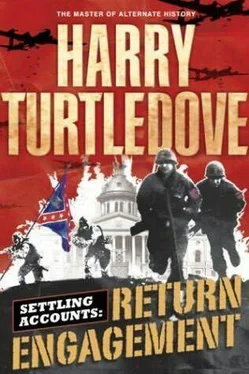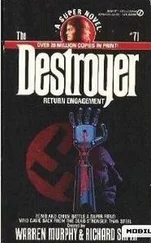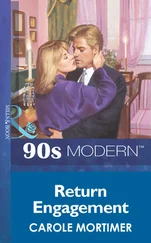Harry Turtledove - Return engagement
Здесь есть возможность читать онлайн «Harry Turtledove - Return engagement» весь текст электронной книги совершенно бесплатно (целиком полную версию без сокращений). В некоторых случаях можно слушать аудио, скачать через торрент в формате fb2 и присутствует краткое содержание. Жанр: История, на английском языке. Описание произведения, (предисловие) а так же отзывы посетителей доступны на портале библиотеки ЛибКат.
- Название:Return engagement
- Автор:
- Жанр:
- Год:неизвестен
- ISBN:нет данных
- Рейтинг книги:5 / 5. Голосов: 1
-
Избранное:Добавить в избранное
- Отзывы:
-
Ваша оценка:
- 100
- 1
- 2
- 3
- 4
- 5
Return engagement: краткое содержание, описание и аннотация
Предлагаем к чтению аннотацию, описание, краткое содержание или предисловие (зависит от того, что написал сам автор книги «Return engagement»). Если вы не нашли необходимую информацию о книге — напишите в комментариях, мы постараемся отыскать её.
Return engagement — читать онлайн бесплатно полную книгу (весь текст) целиком
Ниже представлен текст книги, разбитый по страницам. Система сохранения места последней прочитанной страницы, позволяет с удобством читать онлайн бесплатно книгу «Return engagement», без необходимости каждый раз заново искать на чём Вы остановились. Поставьте закладку, и сможете в любой момент перейти на страницу, на которой закончили чтение.
Интервал:
Закладка:
Mules aimed their bombs by aiming themselves at their target. They were far more accurate than high-altitude bombers-they were, in effect, long-range heavy artillery. Counterbattery fire hadn't put the U.S. guns out of action. A dozen 500-pound bombs silenced them.
"Let's go, boys!" Colleton yelled, emerging from his foxhole and dashing forward. His men came with him. If he'd called for them to go forward and hung back himself, they wouldn't have moved nearly so fast. He'd discovered that in the Great War. He was one of the lucky ones. He'd had only minor wounds, hardly even enough to rate a Purple Heart. An awful lot of brave Confederate officers-and damnyankees, too-had died leading from the front.
Even without their artillery, the U.S. soldiers in Grove City didn't intend to leave. Tracer rounds from several machine guns sketched orange lines of flame across the fields. Men went down, some taking cover, others because they'd been hit. The volume of fire here was less than it had been on the Roanoke front; this was a war of movement, and neither side got the chance to set up defenses in depth the way both had a generation earlier. But even a few machine guns could take the starch out of an attacking infantry regiment in a hurry.
"Goddammit, where the hell are the barrels?" somebody shouted.
Whoever that fellow was, noncom or more likely private, he thought like a general. Barrels-a few stubborn Confederates called them tanks, the way the British did-were the answer to machine-gun fire. And here they came, five-no, six-of them, as if the bellyaching soldier really had summoned them. The U.S. machine guns started blazing away at them. You needed a bigger door knocker than a machine-gun round to open them up, though. The bullets sparked off their butternut-painted armor.
The barrels also carried machine guns. They started shooting up the U.S. position at the southern edge of Grove City. And the barrels' cannon spoke, one by one. One by one, the Yankees' machine guns stopped shooting back. Rifle fire still crackled, but rifle fire couldn't wreck advancing foot soldiers the way machine guns could.
"Let's go!" Tom Colleton yelled again. He panted as he dashed forward. He'd been a kid during the Great War. He wasn't a kid any more. He flinched when a bullet whined past him. Back then, he'd been sure he would live forever. Now, when he had a wife and kids to live for, he knew all too well that he might not. He didn't hang back, but part of him sure as hell wanted to.
Young soldiers on both sides still thought they were immortal. A man in U.S. green-gray sprang up onto a Confederate barrel. He yanked a hatch open and dropped in two grenades. The barrel became a fireball. The U.S. soldier managed to leap clear before it blew, but Confederate gunfire cut him down.
Five trained men and a barrel, Tom thought glumly. The damnyankee had thrown his life away, but he'd made the Confederates pay high.
Another barrel hit a buried mine. Flames spurted up from it, too, but most of the crew got out before the ammunition inside started cooking off. The remaining barrels and the Confederate infantry pushed on into Grove City. Tom waited for barrels painted green-gray to rumble down from the north and stall the Confederate advance. He waited, but it didn't happen. The USA didn't seem to have any barrels around to use.
They're bigger than we are, Colleton thought as he peered around the corner of a house whose white clapboard sides were newly ventilated with bullet holes. They're bigger than we are, but we're a lot readier than they are. If we'd waited much longer, we'd be in trouble.
But the Confederate States hadn't waited, and their armies were going forward. In the last war, they'd thrust toward Philadelphia, but they'd fallen short and been beaten back one painful mile at a time. Other than that, they'd fought on the defensive all through the war. Tom had been part of it from first day till last, and he'd never once set foot on U.S. soil.
Here he was in Ohio now. Jake Featherston had always said he would do better than the Whigs had when it came to running a war against the United States. Tom had had his doubts. He'd never sold his soul to the Freedom Party, the way he often thought his sister had. You couldn't argue with results, though. A couple of weeks of fighting had taken the Confederacy halfway from the banks of the Ohio River to the shores of Lake Erie. If another two or three weeks could take the CSA the rest of the way…
If that happens, the United States get to find out what it's like when an axe comes down on a snake. Both halves wiggle for a while afterwards, but the damn thing dies just the same. Tom grinned fiercely, liking the comparison.
Freight-train roars in the sky reminded him that the damnyankees weren't cut in half yet. Half a dozen soldiers yelled, "Incoming!" at the same time. The Mules might have knocked out the battery that had flayed the regiment as it advanced, but the USA had more guns where those came from.
And, along with the usual roaring and screaming noises shells made as they flew toward their targets, Tom also heard sinister gurgles. He knew what those gurgles meant. He'd known for more than a quarter of a century, though he'd hoped he might forget what he knew.
"Gas!" he shouted. "They're shooting gas at us!" He pulled his mask off his belt and thrust it over his face. He had to make sure the straps that held it on were good and tight and that it sealed well against his cheeks. No soldier who wanted to make sure he was safe against gas could afford to grow a beard.
Shells thudded home, one after another. Most were the robust black bursts with red fire at their heart that Tom had long known and loathed. A few of them, though, sounded more like sneezes. Those were the gas shells going off. Tom wondered what kind of gas the Yankees were using. A mask alone wasn't really enough protection against mustard gas. It would blister your hide as well as your lungs. A few gas specialists wore rubberized suits along with their masks. A rubberized suit in Ohio in July was torture of its own.
The gas would also torment the defenders in Grove City, who were falling back toward the racetrack at the north end of town. The Yankee high command didn't seem to care. The more they slowed down the Confederates, the longer they would have to fortify Columbus.
Tom wondered if his own side could be that ruthless. Part of him hoped so, if the need ever arose. But he prayed with every fiber of his being that such a day of need would never come.
Brigadier General Abner Dowling stood by the side of Highway 62, watching U.S. soldiers fall back from the south and into Columbus. Dowling didn't think he had ever seen beaten troops before. In the Great War, he'd watched George Custer throw divisions into the meat grinder, sending them forward to take positions that couldn't possibly be taken. Where divisions went forward, regiments would come back. Before barrels changed the way the war was fought, machine guns and artillery made headlong attacks impossibly, insanely, expensive-which hadn't stopped Custer from making them, or even slowed him down.
Those who lived through his folly had been defeated, yes. By the nature of things, what else could have happened to them? But they hadn't been beaten, not the way these soldiers were. They'd been ready to go back into the fight as soon as the trains disgorged some more newly minted, shiny troops to go in with them.
Looking at the men trudging up the asphalt towards and then past him, Dowling knew they weren't going to be ready for battle again any time soon. They weren't running. Most of them hadn't thrown away their Springfields. Their eyes, though… Their eyes were the eyes of men who'd seen hell come down on earth, who'd seen it, been part of it, and had no intention of being part of it again for a long time, if ever.
Читать дальшеИнтервал:
Закладка:
Похожие книги на «Return engagement»
Представляем Вашему вниманию похожие книги на «Return engagement» списком для выбора. Мы отобрали схожую по названию и смыслу литературу в надежде предоставить читателям больше вариантов отыскать новые, интересные, ещё непрочитанные произведения.
Обсуждение, отзывы о книге «Return engagement» и просто собственные мнения читателей. Оставьте ваши комментарии, напишите, что Вы думаете о произведении, его смысле или главных героях. Укажите что конкретно понравилось, а что нет, и почему Вы так считаете.












